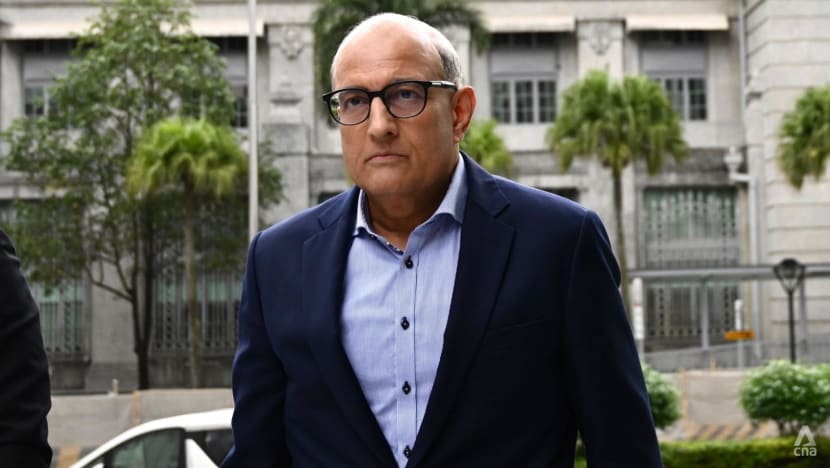CNA Explains: Why was Iswaran allowed to leave Singapore while his court case is ongoing?
CNA's Louisa Tang looks at how the courts decide whether an accused person should be allowed to travel overseas.

Former Transport Minister S Iswaran arriving at State Courts on Feb 8, 2024. (Photo: CNA/ Marcus Mark Ramos)

This audio is generated by an AI tool.
SINGAPORE: Singapore's former Transport Minister S Iswaran was on Thursday (Feb 8) granted permission by a court to leave Singapore and travel to Australia for about two weeks, to help his son settle into university.
The 61-year-old was returning to court after being handed 27 criminal charges last month, including for corruption.
Under what conditions are accused persons allowed to leave Singapore?
Individuals who face criminal charges and want to travel overseas have to submit to the courts an application to leave jurisdiction — or LEJUR as it's called in legal circles.
Judges will then assess factors such as the likelihood of an accused person absconding, as well as the nature and gravity of their alleged offences.
The courts will also consider the accused person’s reason for leaving Singapore, said Mr Mark Yeo, director of Fortress Law.
He cited other factors like whether the accused has established roots in Singapore — including family, assets and businesses — and how long they intend to travel abroad for.
Judges will typically reject a LEJUR application if an accused person is found to be at risk of absconding or if it delays court proceedings unnecessarily.
If granted permission to leave Singapore, judges will typically impose additional bail conditions to deter an accused person from fleeing.
Ms Tania Chin, head of TSMP Law Corporation’s criminal litigation and investigations practice, said the bail money was the main safeguard, given that the bailor — someone who posts bail for an accused person — could lose part of or the whole sum if the accused person absconds.
Bailors can also pledge personal property as a form of bail.
They must keep in daily communication with the accused person, as well as ensure they attend court and follow all bail conditions — including returning to Singapore.
Ms Chin added: “Apart from that, an accused person would typically also be required to provide their flight itinerary, contact details and address while overseas, for the authorities to reach the accused person where necessary.”
Accused persons will also usually have to surrender their passport within 24 hours of returning to Singapore.
Are Iswaran’s bail conditions out of the norm?
On Thursday, a judge allowed Iswaran to leave Singapore from Feb 16 to Mar 4 after his bailor agreed to additional bail conditions.
These conditions, which were proposed by the prosecution, included an additional bail sum of S$500,000 (US$372,000) in cash on top of Iswaran’s existing S$800,000 bail. He also has to provide his travel itinerary and overseas address to the investigating officer, and remain contactable by the officer at all times.
Lawyers told CNA that Iswaran's bail conditions are similar to what other accused persons would face — and crafted to ensure he does not abscond.
Mr Yeo noted that the additional bail sum of S$500,000 was uncommon by itself, but has to be seen in context.
“For this case, as Iswaran’s bail was originally set at S$800,000, an additional bail of S$500,000 is to be expected,” he added.
“Notably, this bail sum has to be furnished by someone other than the accused, and the money for the said bail cannot come from the accused directly or indirectly, as the accused is not allowed to indemnify his bailor should he abscond.”
Ms Chin pointed out that the quantum of bail imposed typically depends on factors like an accused person’s alleged offences, and how likely it is that they would flee if the bail sum is too low.
Have there been high-profile accused persons who applied to leave Singapore?
In 2010, British author Alan Shadrake said he would apply to leave Singapore after he was sentenced to six weeks’ jail and a S$20,000 fine for contempt of court. At the time, it was the heaviest punishment handed down for scandalising the judiciary.
He eventually decided against it after the Attorney-General’s Chambers objected to the potential application. The court had also mentioned that he might have to post security in the region of S$80,000.
The founding pastor of City Harvest megachurch, Kong Hee, was granted permission to travel overseas in 2012 while facing charges of misusing millions in church funds at the time.
His bail was increased from the original amount of S$500,000 but his defence counsel declined to reveal the new amount, his itinerary and travel dates. Kong has been released from jail since.
More recently, a couple of Chinese nationality were initially granted permission to leave Singapore while on trial in 2020 for withholding information from COVID-19 contact tracers. Their original bail amount of S$10,000 each was increased by S$80,000 each.
However, a High Court judge subsequently overturned the district court’s decision, after the prosecution argued that the couple posed a high flight risk - despite the bail increase.
In 2022, lawyer and former Reform Party chairman Charles Yeo was also granted permission to travel to Vietnam for three days for work. He faced charges that included harassment and wounding the religious feelings of Christians.
Yeo then went on the run, saying he was seeking political asylum in the UK and did not intend to return to Singapore.
Last month, Gilbert Oh Hin Kwan, a director-general at the Ministry of Foreign Affairs, was given permission to travel to Tokyo for about three weeks, to visit his pottery master among other leisure purposes.
Oh has been charged over the use of diplomatic bags for Panadol and luxury watches. His bail sum was doubled to S$20,000, among other conditions.




















